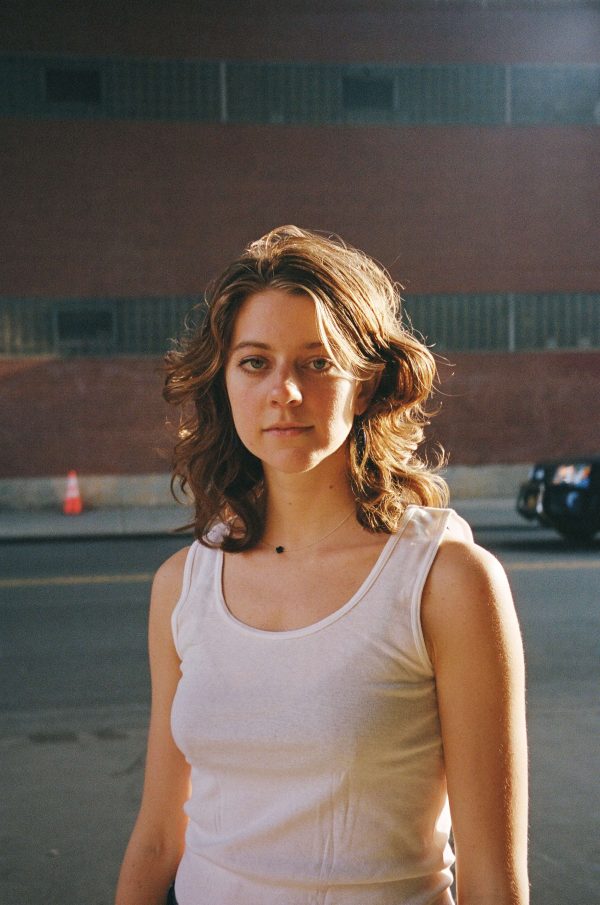
On Jellywish Florist invite listeners to question everything — to imagine a world where magic, surrealism, and the supernatural are our companions in day-to-day life. It dares to present a realm of possibility and imagination in a time that feels evermore prescriptive, limiting, and awful. The album finds Florist exploring life’s big questions without offering silver linings, morals, or definitive answers. Instead, the band asks perhaps the most difficult of questions: Is it possible to break free from our ingrained thought cycles and pedestrian way of life? That, Florist posits, may be the only way to be truly happy, fulfilled, and free.
Singer, guitarist, and principal songwriter Emily Sprague says that the record is purposely complicated. “It’s a gentle delivery of something that is really chaotic, confusing, and multifaceted,” she explains. “It has this technicolor that’s inspired by our world and also fantasy elements that we can use to escape our world.”
“We enter an observational fever dream about floating through liminal space between lifetimes, individual perceptions. There is reflection on our connectedness in joy and suffering through the wish for a peaceful place for our spirits to live and land,” Sprague explains. “‘Have Heaven’ establishes the world of the album to be not quite always lucid, but rather a perspective that is blended into the worlds of the magic and death realms swirling around us. The chorus is a chant that pleads for a better symbiosis between these worlds, and between our earthly forms trying to survive alongside each other, bound to the systems we must exist within.”
Jellywish is an exercise in multidimensional world building. The album’s panoramic cover art, which looks like something out of a Henry Darger volume, wraps the music in a collage of color that presents as science fiction-adjacent, hinting at something mysterious, fantastical, and mythological. Inside the album’s jacket, however, are tender and catchy sonic meditations on life’s most knotty subjects: life, death, earth, reality, relationships, joy, and pain. Taken together, Florist offers an acute sense of the band at this moment, one that worries about the world and its place in it. In contrast, it also presents an alternative to the doldrums of day-to-day life, and the necessary suggestion that very different things may be true at the same time.
With Jellywish, Florist offers a complex album in a time that is anything but simple. In mining the chaos and wonder of physical and spiritual worlds, the band holds a mirror to itself to the great benefit of all. It tells us that we are not alone, and challenges us to believe in magic.

Allegra Krieger
“I Keep My Feet on the Fragile Plane” – Allegra Krieger’s fourth record and her first with Double Double Whammy – is her most mature and alluring work yet. It contains all the signatures of her best lyricism: delicate and precise phrasings, moments that flicker between beauty and banality, meaning that forms through the accretion of observations, memories, and unexpected adages. This is an album that is at once post-theistic and devoted to a relationship with the divine, each song blinking in and out of “the fragile plane,” a place Krieger describes as “a middle ground in the universe,” both abstract and peaceful, where time, bodies, and names don’t exist.
Krieger’s peripateticism has clearly informed her songwriting. She spent her childhood on the blistering beaches and cold Catholic pews of northern Florida. Before settling in Chinatown, she drifted through suburban Pennsylvania, North Carolina, Portugal, Italy, and Ireland cleaning motel rooms, planting trees, tending bars, and picking olives. In “Terribly Free”, she walks with the rats in Manhattan; in “I Wanted to Be” she bites into a ripe orange somewhere in the south; in “Nothing in This World Ever Stays Still” she stands outside of a sports bar in LA watching coastal smoke rise from the hills; later, she describes being “moved by whatever’s moving us.”
It’s with an almost deadly self-awareness that Krieger assembles a world in which people and places leave as quickly and easily as they arrive. “I never forgot,” she tells us in “I Wanted to Be,” “that as something grows something else must rot.” Yet Krieger doesn’t linger too long in honest exhaustion. Soon, she’s drinking coffee and watching a child dance across the street. Later “a brief but brilliant sun touches the hills” and she takes on the child’s inclinations, telling us, “if you feel like dancing, you must let it out, no room for question, no room for doubt.”
Krieger initially collaborated with Luke Temple and Jeremy Harris to record her vocals and guitar to tape at Panoramic Studios in West Marin, CA. As the album continued to form, Krieger envisioned instruments – like the French and English horn (Nancy Ranger and Priscilla Reinhart), electric guitar (Jacob Drab), and pedal steel (Kevin Copeland) – as characters which would walk in and out of the soundscape. What emerged from conversations with composer Sammy Weissberg, are brass parts that have a dark, almost surreal logic: horns arise to emphasize a word or phrase, fall out completely, only to rush back with dissonant orchestrations that gesture simultaneously toward deterioration and generation. Krieger herself plays pedal steel on “I Wanted to Be,” a song which was finished at Science is Magic Studios, and takes the form of an ouroboros: the chorus feeds into itself in a seemingly endless cycle before colliding into a rising clash of Krieger’s pedal steel and Drab’s electric guitar. While Krieger takes inspiration from Elliot Smith’s honesty, Judee Sill’s cosmic reaching, and Joni Mitchell’s sharp noticing, the dream-like association, harmonic dissonance, and angular melodic ascensions in each song are singularly and delightfully Krieger’s.
“I Keep My Feet on the Fragile Plane” is a daring collection of songs by an artist who scries with both the cold glass eye of truth and the beating heart of empathy; who portrays life in all its twisted complexities and in turn makes the felt and invisible, visible.



